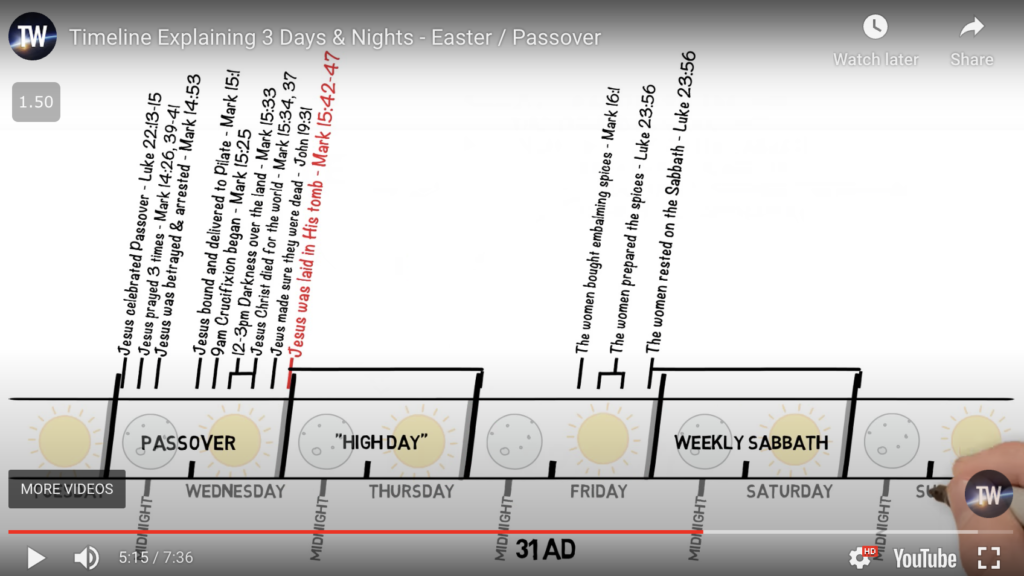Good Wednesday?


This past week I was responding to someone in the comments section of my blog and I came across an issue I hadn’t encountered before…
It turns out that some groups will argue that Jesus didn’t die on Good Friday, but on the Wednesday before. I’ve noticed this chiefly among Fundamentalists and Messianic Jews. The case is made from Jesus’ own words in Matthew’s Gospel:
“For as Jonah was three days and three nights in the belly of the whale, so will the Son of man be three days and three nights in the heart of the earth.”
Matthew 12:40
It is argued that in order for Jesus’ words to be true, we must work backwards three full days and three full nights from Resurrection Sunday. If we do this, we would conclude that Christ’s Crucifixion took place, not on Friday, but Wednesday:
Some of these folks will say that Christians of past generations simply made a mistake in placing the Crucifixion on Good Friday, but others go further, arguing that this was an attempt to Paganize Christianity (although, as is typical with such assertions, I’m rather at a loss as to what this achieves).
So, how might we respond to this claim?
Where to begin?
The first thing to establish is when Scripture says that Jesus was crucified. Scripture repeatedly says that Jesus was crucified on the “the day of preparation” (Luke 23:54). This refers to the “day of preparation” for the Jewish Saturday Sabbath i.e. Friday.
However, if you watched the above video, you’ll see that it claims there was another High Day on Thursday of that week for which there was another day of preparation on Wednesday!
Regarding this claim, I see two problems. The first problem is that the phrase “the day of preparation” in First Century Israel means Friday, even if that meaning grew broader in later centuries. However, it’s the next piece of information which makes it clear to me that this “day of preparation” was a Friday:
And Joseph took the body, and wrapped it in a clean linen shroud, and laid it in his own new tomb… Mary Magdalene and the other Mary were there, sitting opposite the sepulchre.
Next day, that is, after the day of Preparation, the chief priests and the Pharisees gathered before Pilate…Now after the sabbath, toward the dawn of the first day of the week [Sunday], Mary Magdalene and the other Mary went to see the sepulchre.
Matthew 27:59, 28:1
Matthew has been talking about “the sabbath” throughout this passion narrative and here he tells us that the day after that sabbath was a Sunday, thus making the “day of preparation” for that sabbath a Friday.

Under the traditional chronology, the women are keen to get to the tomb as soon as possible to anoint Jesus’ body. However, under the video’s chronology, the women are in less of a hurry. In fact, they took an entire day (Friday) to prepare the spices. I rather doubt that it would have taken an entire day to prepare some spices and it seems unlikely that they would delay anointing a body in that climate:
Jesus said, “Take away the stone.” Martha, the sister of the dead man, said to him, “Lord, by this time there will be an odor, for he has been dead four days.”
John 11:39
Semitic Idioms
So, from everything said thus far, I conclude that Jesus was crucified on Friday. But what about the original claim? If Jesus was crucified on Friday afternoon, surely he’s not in the grave for “three days and three nights”?
The key point which is overlooked in this argument is that records of time in Scripture follow the idioms of the time of New Testament Semitic culture. These two Protestant scholars provide a nice summary of what we must remember when looking at the timeline of Passion Week:
“Three days and three nights was a Jewish idiom to a period covering only two nights”
R. T. France, Matthew
“In rabbinical thought a day and a night make an onah, and a part of an onah is as the whole. . . . Thus according to Jewish tradition, ‘three days and three nights’ need mean no more than ‘three days’ or the combination of any part of three separate days”
D.A. Carson, Expositor’s Bible Commentary
If you watched the above video arguing for “Good Wednesday”, you’ll see that they just affirm and assume that when Scripture talks about “three days and three nights” that it’s literally 72 hours. However, as the two above scholars have explained, we shouldn’t assume that.
So, how does understanding this Semitic idiom play out during the traditional chronology of Passion Week? Well, Jesus died on Friday afternoon, which would be Day #1. At sundown on Friday, Day #2 would begin and finally Day #3 would start at sundown on Saturday. Thus, when Jesus later rose, it was “on the third day” (Matthew 20:19).
3 days and 3 nights IN THE HEART OF THE EARTH. So if Friday afternoon(when he allegedly died) counted as 1 day, then explain how. How does him dying on Friday and that counting as one day leave any time to come even close to being IN THE HEART OF THE EARTH for three days and 3 nights?
Did you read the post and watch the video?
Here’s a really short explanation:
https://www.catholic.com/magazine/blog/how-to-count-three-days